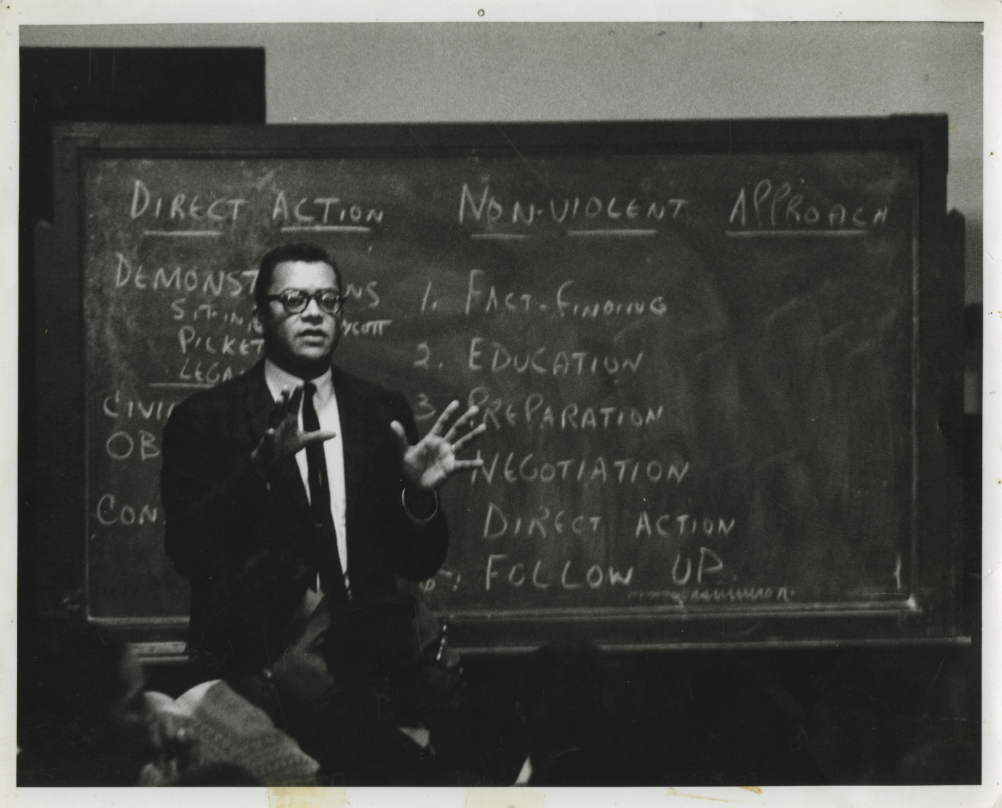The strategic partnership between the James Lawson Institute for the Research and Study of Nonviolent Movements and the Jean and Alexander Heard Libraries is impacting research and scholarly conversation in the Vanderbilt community. The Institute, which launched on April 7, 2022, is a joint venture between Vanderbilt Divinity School and the College of Arts and Sciences. Divinity Library Director Bobby Smiley reflected on the partnership thus far: “Working alongside the JLI, beginning with its planning stages, has afforded the Divinity Library new opportunities for outreach, programming, and community partnerships, as well as inclusion in the Institute’s shared governance, The JLI advisory board.”
Lawson Institute Director Phillis Sheppard offered that this partnership exists to “create opportunities for dialogue, education, and research to honor the legacy of Rev. James M. Lawson and non-violent movements for the pursuit of social justice.” A prime example of this collaborative dialogue took place around the exhibit Outreach Librarian for Religion and Theology Kashif Graham co-curated with Molly Dohrmann, curator of Special Collections. The exhibit, entitled: “Education, Preparation, Negotiation”: Reverend James M. Lawson, Jr. and His Legacy of Nonviolence, contained a wealth of letters, images, and other artifacts from James Lawson’s personal collection. The need for open conversation arose regarding displaying challenging historical objects, such as hate mail. The JLI and libraries invited several faculty members to weigh in on the issue, which resulted in a more well-rounded exhibit.
Graham was invited to sit on the Institute’s advisory committee in September of 2022. Graham states that this is the result of the Divinity Library’s embeddedness in the Divinity School, “Academic partnerships are often preceded by personal relationships. People want to partner with people, ultimately. Divinity librarians have been woven into the life of the Divinity School, relationship by relationship.” Graham, who considers his role as outreach librarian to be the principal relationship builder for the Divinity Library, also participated in the Institute’s launch by reading an original poem, “Medical Apartheid.”
Smiley added, “With our archival collection of James Lawson’s materials, the Divinity Library not only acts as a bridge connecting the library to the institute, but also cements a relationship that supports community engagement, helps foster new scholarship and provides collaborative opportunities for pursuing grants.”
This collaboration has already had an impact on the student population of the Divinity School. On October 20 of last year, the institute held an interactive forum, “Queering Activism,” which explored queerness and care in activism work. Graham was one of the forum’s panelists. Graham and Dohrmann will also be featured in the authorized documentary A Better Way: James Lawson, Architect of Nonviolence, directed and produced by Karen Hayes.
The James Lawson Institute and Divinity Library anticipate further collaboration towards the university’s objectives of student learning, faculty research and information equity.

